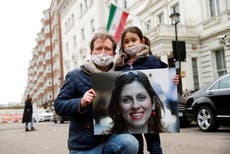It is agonising to read about the treatment of Nazanin Zaghari-Ratcliffe – how can humans be so cruel?
The lack of compassion, the mental torture, comes from the darkest places. We must confront this if we are to truly expose human rights abuses

Your support helps us to tell the story
From reproductive rights to climate change to Big Tech, The Independent is on the ground when the story is developing. Whether it's investigating the financials of Elon Musk's pro-Trump PAC or producing our latest documentary, 'The A Word', which shines a light on the American women fighting for reproductive rights, we know how important it is to parse out the facts from the messaging.
At such a critical moment in US history, we need reporters on the ground. Your donation allows us to keep sending journalists to speak to both sides of the story.
The Independent is trusted by Americans across the entire political spectrum. And unlike many other quality news outlets, we choose not to lock Americans out of our reporting and analysis with paywalls. We believe quality journalism should be available to everyone, paid for by those who can afford it.
Your support makes all the difference.After five years of imprisonment in Iran, Nazanin Zaghari-Ratcliffe has had her ankle tag removed and is now allowed to leave her home.
That is not what freedom should look like for an innocent woman who has been separated from her life, her six-year-old daughter Gabriella, and her husband Richard. What freedom looks like is Nazanin, British passport in hand, boarding a plane bound for Heathrow.
For the past five years, Amnesty International and Redress have been campaigning with Richard Ratcliffe, to keep Nazanin’s case in the public eye and to keep the pressure on the Iranian government to release her. My family and myriad other supporters have campaigned alongside them. Their MP, Tulip Siddiq, has been an absolute champion. This weekend, we face a painful wait to see what happens when she appears again before an Iranian court.
I forced myself to read Redress’s full report on the conditions Nazanin has been kept in these five years and the impact on her physical and mental health. It is an agonising read and leaves you wondering how human beings can come together and agree to collectively treat an innocent person like this. The lack of compassion, the mental torture, comes from the darkest places, which none of us want to acknowledge exist. But we must if we are to truly expose human rights abuses.
I have met Richard on a number of occasions and my brother has stood by him from the very start, before any news outlets were picking up on the story. I remember saying to my brother in those early days, “It’s Iran. They do this stuff all the time. Relax. They’ll let her out in a week or so.” They did not.
In the report, I read how Nazanin was sleep deprived, how she was chained and held in a tiny, brightly lit cell for long periods of time. She was told her husband had moved on, that he’d forgotten about her. She was not to know that all Richard has talked about or thought about since the day they stole her freedom was her and how to get her home.
There were some abuses in the report, which Richard had mentioned to us already. This was one that shredded my heart: a female guard, knowing Nazanin was separated from her own baby girl, knowing she was missing out on all the cuddles, the fun, the laughter, the raising of her baby, would sit by Nazanin’s cell and talk loudly with her own child on the phone.
There is no reason for a prison guard to sit and chat with their young child while on duty other than to torture an inmate who is aching to do the same with her own.
I’m fluent in Farsi, I could clearly imagine what the prison guard might have been saying to her child. We Iranians do something with our children called “ghorboon sadigheh”. It describes the wildly emotional language we use to heap emotional praise on our children. For example, something along these lines is frequent and perfectly normal in everyday chit chat: “Mummy loves you, my beautiful angel, mummy’s been blessed with your existence, God willing mummy will die for you, God willing I will die for your beautiful face, for your eyes, for your radiant soul, I will sacrifice my life for the way you speak, the way you glance at me, you are mummy’s heart, my hope, my liver, would you like a bun?”
To be forced to listen to another mother “ghorboon saddigheh” their child, have a laugh with their child, be tender to their child, when they are part of the very system keeping you from doing the same is a method of torture only the most despicable human beings can dream up.
One gloriously hot day last summer, Richard Ratcliffe brought Gabriella over to play with my own daughter, Vivie, who is the same age. The girls got on like a house on fire and went into the world children go together when they are locked in play. I spoke to Nazanin on the phone. I could feel her heart in her voice as I described how our daughters were soaking each other in the garden with a hose, my dog leaping about them. “Take pictures! Take pictures!” she kept exclaiming. “Film them! Film them and send them to me.” I did.
I then heaped strawberries on a plate for Gabriella and watched as she took them out to the garden. Such a simple thing to do for a child but one that made me so sad because her mum has been denied these simple things for years.
She should have been with us that day and watched the girls laughing till they cried at each other’s antics. We all wait and hope for Nazanin’s freedom this Mother’s Day.




Join our commenting forum
Join thought-provoking conversations, follow other Independent readers and see their replies
Comments